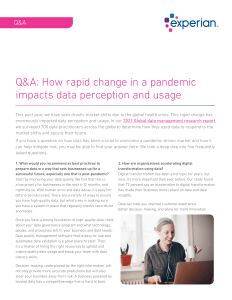This past year, we have seen drastic market shifts due to the global health crisis. This rapid change has enormously impacted data perception and usage. In our 2021 Global data management research report we surveyed 700 data practitioners across the globe to determine how they used data to respond to the market shifts and secure their future.
If you have a question on how data has been crucial to overcome a pandemic-driven market and how it can help mitigate risk, you may be able to find your answer here. We took a deep dive into five frequently asked questions.
1. What would you recommend as best practices to prepare data in a way that sets businesses up for a successful future, especially one that is post-pandemic?
Start by improving your data quality. We find that this is a top priority for businesses in the next 6-12 months, and rightfully so. With human error and data decay, it’s easy for data to be inaccurate. There are a variety of ways to ensure you have high-quality data, but what’s key is making sure you have a system in place that regularly checks records for anomalies.
Once you have a strong foundation of high-quality data, think about your data governance program and what technology, people, and processes will fit your business and data needs. Data quality management software that is easy-to-use and automates data validation is a great place to start. Then, it’s a matter of hiring the right resources to uphold and inspire quality data usage and equip your team with data literacy skills.
Decision-making, underpinned by the right information, will not only provide more accurate predictions but will also steer your business away from risk. A business powered by trusted data has a competitive edge that is hard to beat.
2. How are organizations accelerating digital transformation using data?
Digital transformation has been a hot topic for years, but now, it’s more important than ever before. Our study found that 72 percent say an acceleration to digital transformation has made their business more reliant on data and data insights.
Data can help you improve customer experience, better decision-making, and allow for more innovation.
When it comes to accelerating digital efforts, data is a reliable source as you determine your digital strategy for both customer experience and operations.
By capturing and managing valid data, you can equip yourself with the right customer contact data, so you know who your customers are and how to reach them. This information alone can help support digital initiatives because it provides an easier online check out process for your customers (A.K.A a better customer experience) and gets your business the right information to ship packages, personalize marketing campaigns, and support customer service calls (even when working from home!).
3. What data quality software is available to ensure a seamless digital customer experience?
For a seamless digital customer experience, think about integrating a real-time data validation tool into your customer-facing interfaces. This will enable you to capture accurate emails, phone numbers, and mailing address— information that is crucial to staying in touch with your customers. Not only that, a real-time data validation software will reduce keystrokes during the checkout process, lessening shopping cart abandonment and improving customer experience from the get-go.
4. Data quality is a top priority for businesses. How do you get started?
In our research, we find that 91 percent of businesses are improving data quality, on some level, over the next 6-12 months. Businesses are realizing the importance of highquality data and the impact it has on responding to drastic market shifts and preparing for what’s ahead.
Start by cleaning your data. Here’s how:
1. Determine gaps within your data. To do this, consider a data quality assessment that will highlight current errors across your database like clients who aren’t even born yet or have duplicative SSNs!
2. Select a data quality tool. This could be a real-time data validation software, integrated into your customer-facing interfaces, or a batch cleanse, where you clean your data in bulk on a regular cadence.
3. Lastly, sustain your data quality. You can do this by taking it a step further than technology and hiring data professionals and implementing data practices across your organization
5. How do you enable agility within data practices in an organization?
To enable agile data practices across your organization, be proactive with your data quality by taking a systematic approach to integrate data quality control processes into every part of your organization.
Agile data practices could be in the form of DataOps. This emerging trend is defined in our study as the automation and monitoring at all steps of the data pipeline construction— from data integration, testing, and releasing to deployment and infrastructure management. At its basic level, it is the operational visibility of what data exists and it’s level of quality. In a more sophisticated form, it is the coming together of governance, quality, and data engineering disciplines to create a more dependable ecosystem for the business.
Bringing agility to your data practices will enable you to continuously back your decisions with relevant insight, allow for operational efficiency, support innovation, and ensure data accessibility.
Over the past year, our economy has faced tremendous challenges and dramatic market shifts. Our research shows us that trusted data, supported by agile practices and business-wide usage, is the key to finding stable ground again.
Our research surveyed 700 business leaders across the globe on the impact of the pandemic and how it has transformed their data perception and usage.
Read the research



